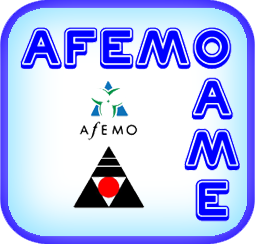

Grade Resources
Overall Lesson Webinar Recording Webinar Support Lesson Support
Select All Clear All
Welcome to this webinar about teaching the new coding expectations for the intermediate grades of the revised mathematics curriculum. We will be taking you through the lessons that have been created as supports for Ontario educators as well as the pedagogy and social emotional learning skills that coding brings to your classroom.
NOTE: This recording does not yet contain the Q&A section - those will be added soon from all the recordings with captioning.
Welcome to this webinar about coding in the mathematics curriculum. We will be taking you through the pedagogy and social emotional learning skills that coding brings to your classroom as well as the lessons that have been created as supports for Ontario teachers in the Junior grades.
NOTE: This recording does not yet contain the Q&A section - those will be added soon from all the recordings with captioning.
Welcome to this webinar about coding in the mathematics curriculum. We will be taking you through the pedagogy and social emotional learning skills that coding brings to your classroom as well as the lessons that have been created as supports for Ontario teachers in the primary grades.
NOTE: This recording does not yet contain the Q&A section - those will be added soon from all the recordings with captioning.
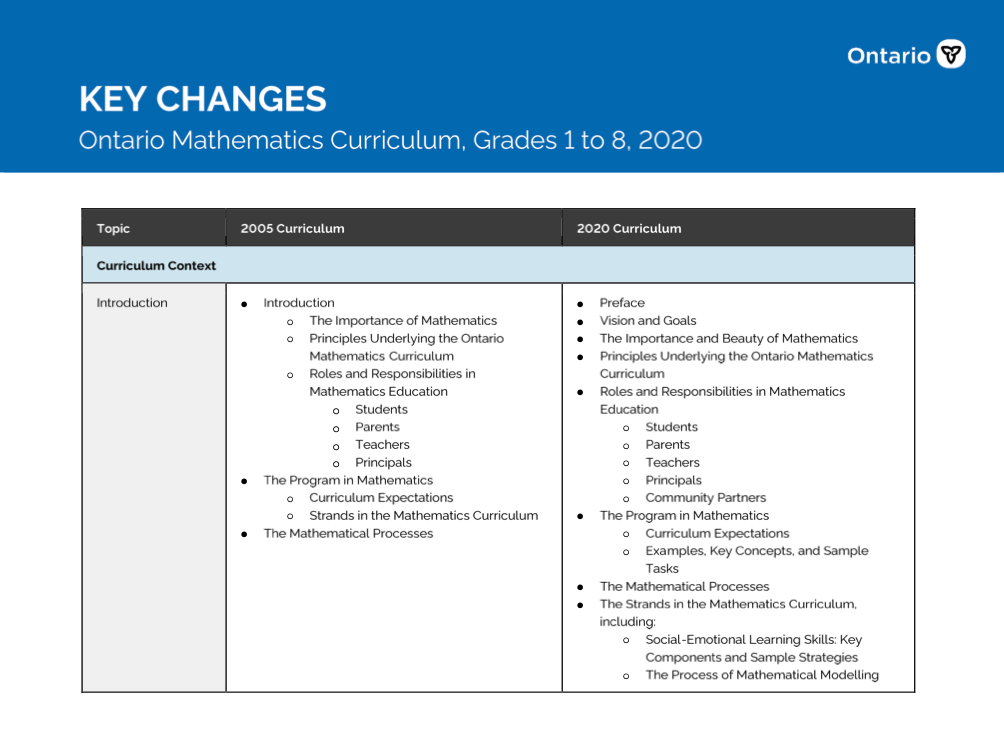 Key Changes - Ontario Mathematics Curriculum, Grades 1 to 8, 2020
[PDF]
Key Changes - Ontario Mathematics Curriculum, Grades 1 to 8, 2020
[PDF]
This document, prepared by the Ontario Ministry of Education, compares in table form the key changes between the 2005 and the 2020 elementary mathematics curriculum.
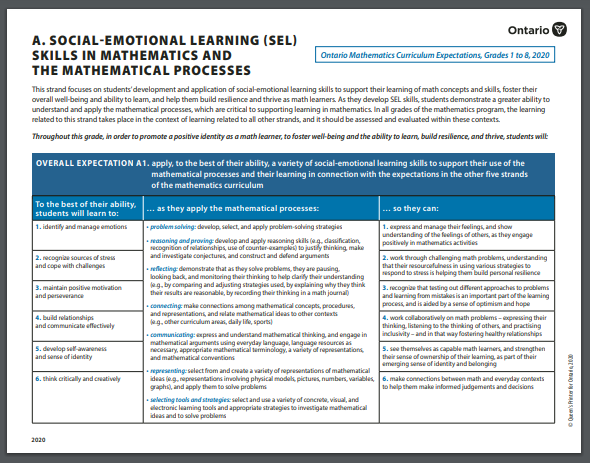 A. SEL continuum of learning expectations, grades 1 - 8 (strand overview)
[PDF]
A. SEL continuum of learning expectations, grades 1 - 8 (strand overview)
[PDF]
Continuum for strand A: Social-Emotional Learning (SEL) Skills in Mathematics and the Mathematical Processes. This one page PDF details the connections between the SEL expectations and the Mathematical Process expectations.
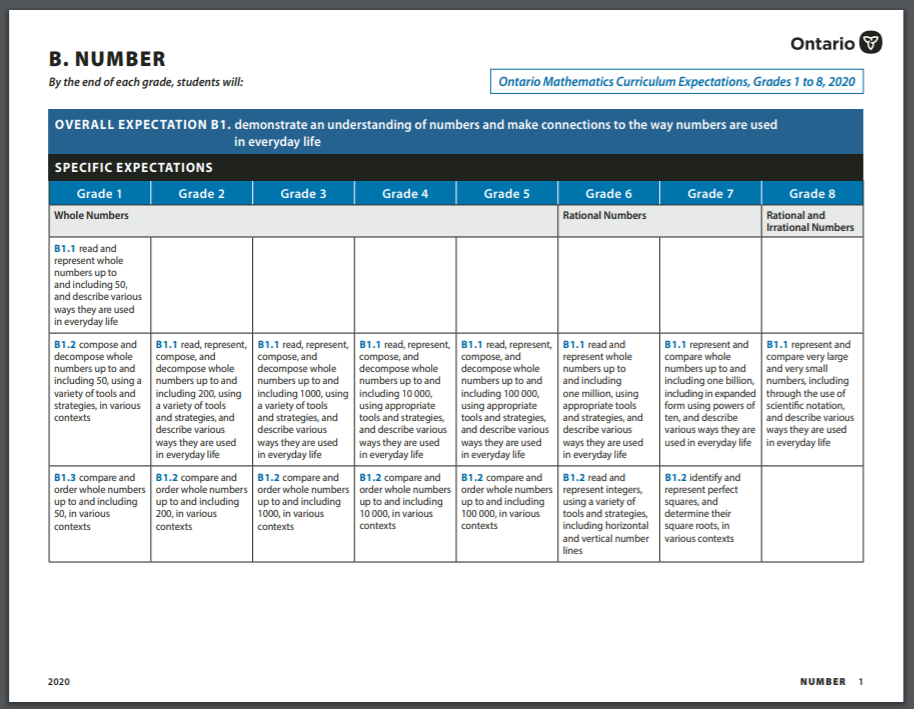 B. Number continuum of learning expectations, grades 1 - 8 (strand overview)
[PDF]
B. Number continuum of learning expectations, grades 1 - 8 (strand overview)
[PDF]
Continuum for strand B: Number. This PDF shows the Overall Expectations as well as the progression of Specific Expectations from Grade 1 through Grade 8.
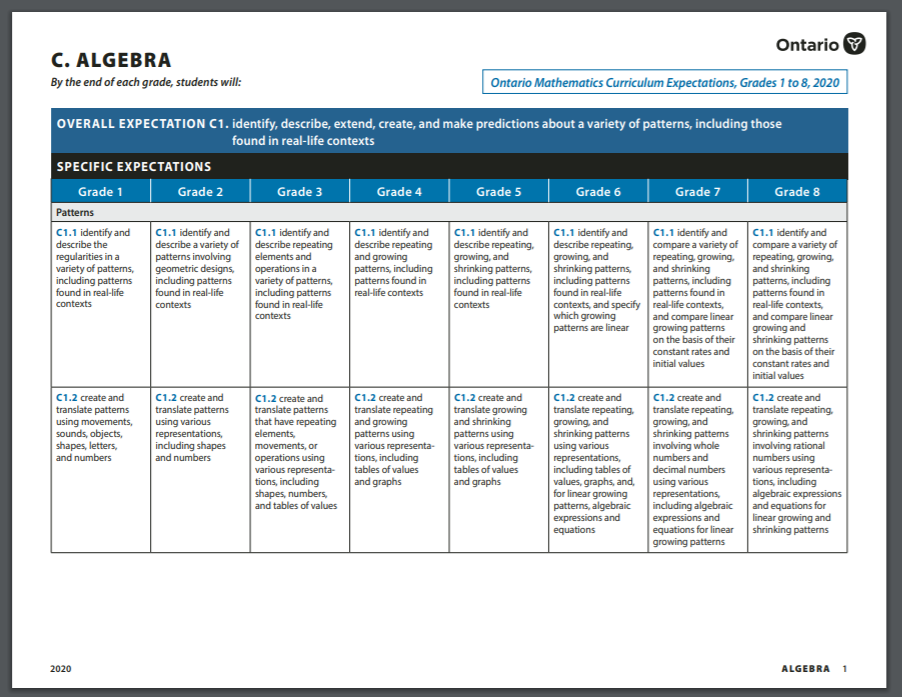 C. Algebra continuum of learning expectations, grades 1 - 8 (strand overview)
[PDF]
C. Algebra continuum of learning expectations, grades 1 - 8 (strand overview)
[PDF]
Continuum for strand C: Algebra. This PDF shows the Overall Expectations as well as the progression of Specific Expectations from Grade 1 through Grade 8.
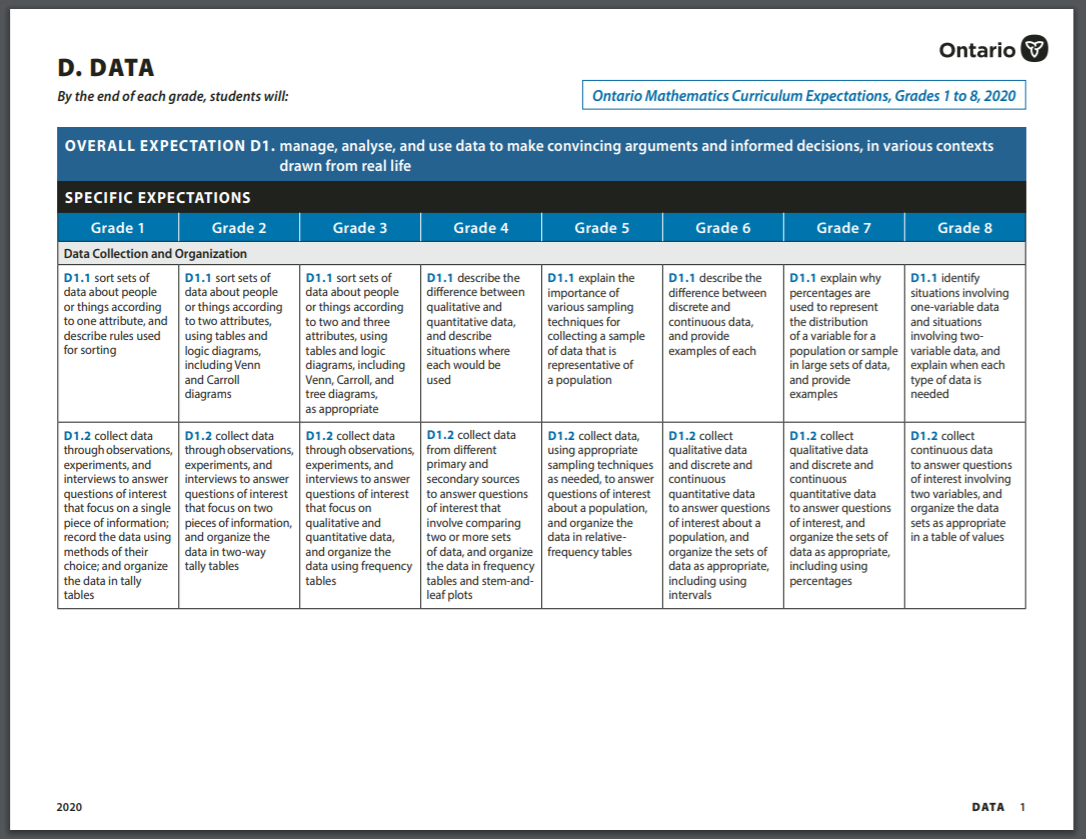 D. Data continuum of learning expectations, grades 1 - 8 (strand overview)
[PDF]
D. Data continuum of learning expectations, grades 1 - 8 (strand overview)
[PDF]
Continuum for strand D: Data. This PDF shows the Overall Expectations as well as the progression of Specific Expectations from Grade 1 through Grade 8.
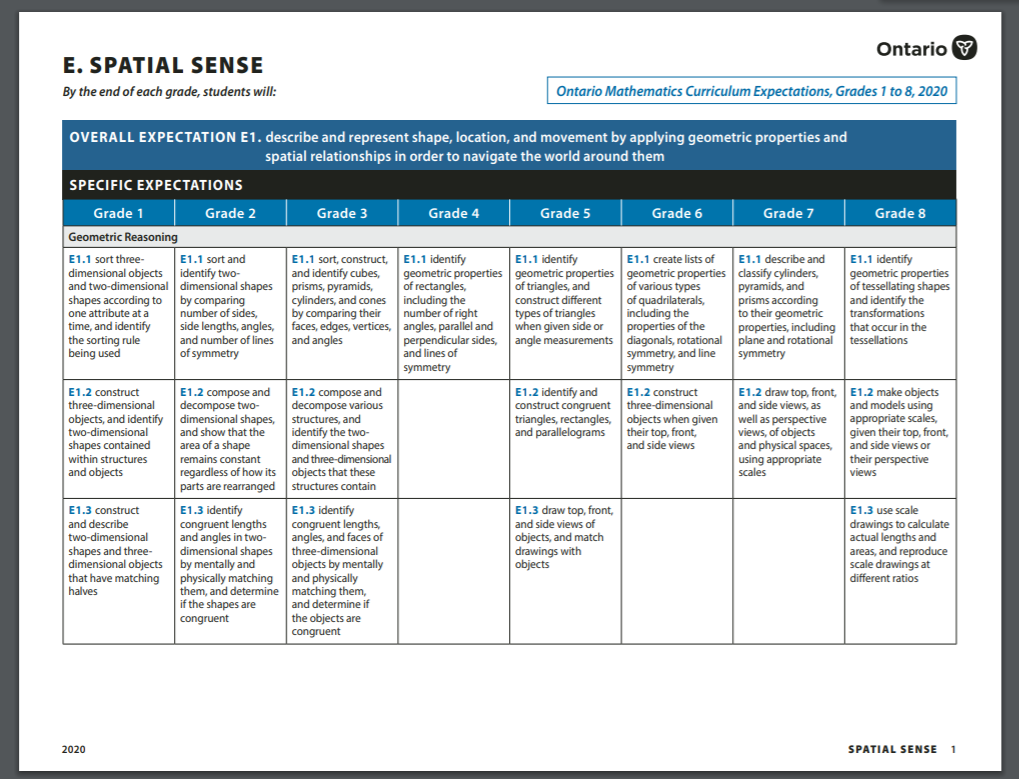 E. Spatial Sense continuum of learning expectations, grades 1 - 8 (strand overview)
[PDF]
E. Spatial Sense continuum of learning expectations, grades 1 - 8 (strand overview)
[PDF]
Continuum for strand E: Spatial Sense. This PDF shows the Overall Expectations as well as the progression of Specific Expectations from Grade 1 through Grade 8.
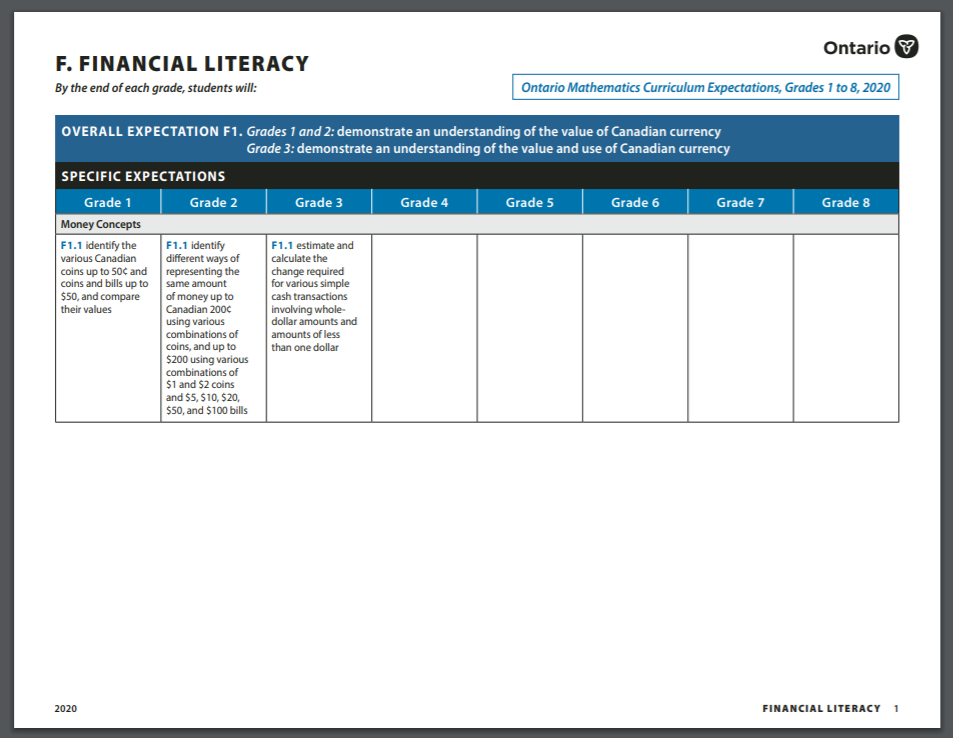 F. Financial Literacy continuum of learning expectations, grades 1 - 8 (strand overview)
[PDF]
F. Financial Literacy continuum of learning expectations, grades 1 - 8 (strand overview)
[PDF]
Continuum for strand F: Financial Literacy. This PDF shows the Overall Expectations as well as the progression of Specific Expectations from Grade 1 through Grade 8.
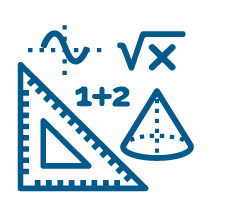 Ontario Mathematics Curriculum, 2020, Grades 1 - 8
[URL]
Ontario Mathematics Curriculum, 2020, Grades 1 - 8
[URL]
This curriculum policy replaces The Ontario Curriculum, Grades 1-8: Mathematics, 2005. Beginning in September 2020, all mathematics programs for Grades 1 to 8 will be based on the expectations outlined in this curriculum policy.
 Ontario Mathematics Curriculum, 2021, Grade 9
[URL]
Ontario Mathematics Curriculum, 2021, Grade 9
[URL]
This curriculum policy replaces The Ontario Curriculum, Grade 9: Mathematics, 2005. Beginning in September 2021, all mathematics programs for Grade 9 will be based on the expectations outlined in this curriculum policy.
Welcome to this webinar about teaching the new Financial Literacy expectations for the intermediate grades of the revised mathematics curriculum. In this webinar, we take you through the lessons that have been created by Ontario educators to support Ontario educators. In developing the Financial Literacy lessons for this project, the intentional decision to use scenarios was made. Scenarios give the opportunity to have a discussion about financial choices and the inequities of access to those choices. The goal was to provide students with a chance to learn and understand the individual skills needed that impact personal financial choices and also the economic literacy needed to understand the impact of financial systems as a whole.
Welcome to this webinar about teaching the new Financial Literacy expectations for the junior grades of the revised mathematics curriculum. In this webinar, we take you through the lessons that have been created by Ontario educators to support Ontario educators. In developing the Financial Literacy lessons for this project, the intentional decision to use scenarios was made. Scenarios give the opportunity to have a discussion about financial choices and the inequities of access to those choices. The goal was to provide students with a chance to learn and understand the individual skills needed that impact personal financial choices and also the economic literacy needed to understand the impact of financial systems as a whole.
Welcome to this webinar about teaching the new Financial Literacy expectations for the primary grades of the revised mathematics curriculum. In this webinar, we take you through the lessons that have been created by Ontario educators to support Ontario educators. In developing the Financial Literacy lessons for this project, the intentional decision to use scenarios-based tasks was made. The goal of the lessons were to provide real-life contexts for students to develop their understanding of money concepts, as an individual and a community.
Welcome to this webinar about teaching the Number expectations for the intermediate grades of the revised mathematics curriculum. In this webinar, we take you through the lessons that have been created by Ontario educators to support Ontario educators. These Number lessons have a focus on developing fraction concepts and skills. These lessons benefit from the latest research about learning fractions, including an emphasis on high-yield visual representations.
Welcome to this webinar about teaching the Number expectations for the junior grades of the revised mathematics curriculum. In this webinar, we take you through the lessons that have been created by Ontario educators to support Ontario educators. These Number lessons have a focus on developing fraction concepts and skills. These lessons benefit from the latest research about learning fractions, including an emphasis on high-yield visual representations.
Welcome to this webinar about teaching the Number expectations for the primary grades of the revised mathematics curriculum. In this webinar, we take you through the lessons that have been created by Ontario educators to support Ontario educators. These Number lessons have a focus on developing fraction concepts and skills. These lessons benefit from the latest research about learning fractions, including an emphasis on high-yield visual representations.
This is a series of 5 lessons, anchored in well known fairy tales, that invite students to learn pseudocoding through simple movements related to spatial reasoning.
In this lesson, students practice directing each other around different obstacles on a full-size grid to an end location by giving and receiving accurate direction.
In this lesson, students are challenged to find a route for a hockey player around numerous obstacles down the ice to the opposing team’s goal.
This is a series of three lessons, anchored in barnyard characters, that invite students to progress from using directional and positional language and physical movement to pseudocoding with numbers and arrows.
Hen Runs Away From Fox: Children learn to animate a character (sprite) using Scratch or a similar block coding platform so that the character moves from left to right across a computer screen.
In this hands-on lesson, students examine the attributes of coins, play games using attributes, create their own coins, and compare the attributes of Canadian coins with students' own imagined coins in so doing, they learn to recognize and describe coins by their attributes e.g., size, shape, colour, image, and texture as well as the value of Candian coins based on their attributes.
I love my name! In this lesson, students will use coin manipulatives to "purchase" the letters in their name in order to make a name plate for themselves. In the process, students learn to compare the value of Canadian coins.
In this lesson, children learn to make a mathematical model in order to predict the number of candies required for a candy bag. Major foci include determining important questions that need answering, missing information that is needed to solve the problem, and making assumptions about missing information.
In this lesson, Grade One students develop a mathematical model to try to predict which new dollhouse furniture would most appeal to kindergarten students before it is purchased.
In this lesson, students learn to divide different shapes and objects into equal parts to share, use math language like halves and fourths to describe equal parts, and understand that more equal shares creates smaller shares.
The class is going on an imaginary visit to the zoo. During the visit, the class is going to feed some of the animals. The class has a limited budget so they can only buy a limited amount of snacks. They can only feed 2 giraffes, 4 lions, 2 chimpanzees, 4 zebras and 2 elephants. Students work in pairs or small groups to decide how to share food fairly among each type of animal making sure to respect the snack preferences of the animals.
The students use their imagination to pretend that they are going to the zoo for a day to work with the zookeepers as assistants. One of their jobs is to divide a specific amount of food equally among the 2 polar bears. They also have to divide the same amounts among 4 grizzly bears and among 10 black bears.
In this lesson, students imagine that a zoo is bringing in some new animals and that they are in charge of designing and building new enclosures for them. The challenge is that there is limited space. Students use their knowledge of fractions ot design the new enclosures.
In this lesson students will have to write unplugged codes using a sequence of actions on a 100's carpet or 10 x 10 grid to pick up enough coins that equal 75¢ to buy a marker.
In this lesson, the students will create and perform a set of dances in a chosen sequence containing precise unplugged instructions for performing the dances.
In this lesson, students use coding devices to do plugged sequential coding to create number sentences while using a 100's chart.
In this lesson, students will read a story and help the squirrel to find, share and store acorns in the forest, and to problem solve using coding skills.
In this lesson, students will calculate amounts of up to $100 for recess equipment.
In this lesson, students will find several ways to represent $ 200 in order to decide what currency they would like to receive from the city for their recycling materials.
In this lesson, students will work on the 2 first components of the math modeling process. They will determine how to organize the math manipulatives area for a grade 2 classroom.
In this lesson, students learn to understand the first 2 components of mathematical modeling. They develop a spatial plan for the grade 2 event in the schoolyard.
Lets create a rating sheet based on criteria to rate how a sequence of movements for DPA can inspire students to move - in this lesson, students learn to understand and develop the 4 components of mathematical modeling. The concept of time is discussed as a possible criteria to rate.
Split, the squirrel, shares his seeds - in this lesson, students learn to create equivalent sharing situations of one-third and two-sixths between 3 squirrels.
In this lesson, Wooly has her Grandma knit sweaters with different combinations of coloured stripes on sweaters to represent one half, two-fourths, one third and two-sixths (surface model). She then knits her scarves with pompoms having the same fraction quantities as the sweaters (set model). The equivalent fractions are then compared for each model. Students represent all of these fractions with different manipulatives. The photos from the centers can then be used for different card games.
In this lesson, students represent multiplication as repeated addition of equal groups, including groups of one-half and one-fourth, and determine the amound of clay needed to buy for the class to create art. They use various tools and drawings to solve the problem.
In this lesson, students represent and solve problems of equitably sharing a whole of up to 10 dried fish among a number of people. The results are mixed numbers. Links to aboriginal activities are presented as a context.
In this lesson students engage in an unplugged lesson that explores spatial sense (location and movement) as well as coding. There are also links to oral communications and the social studies map and globe skills continuum. Students will give their partner a set of directions that will have them move about the classroom using coding strategies.
In this lesson students will explore repeating patterns through dance using an online coding tool as well as with their own bodies. It explores coding skills as well as making cross curricular links to dance.
In this lesson students will have opportunities to estimate change using coins as well as debug code. It explores financial literacy as well as coding.
In this lesson the students create tables of values representing growing and shrinking patterns to solve problems by remixing code. It addresses multiple expectations in the algebra strand.
In this lesson students work on rounding to the nearest 5 and 10 and make change for amounts under a dollar. It explores how pennies are used in cash and virtual transactions and provides an opportunity to discuss the role of the penny.The Missing Penny is the first of two lessons. The companion lesson, Making Change, is the second lesson in this duo. Making Change is found in the Coding lessons.
This lesson looks at what the word value means and how that relates to money. Students explore whether small change has value. In this lesson, students estimate and find the value of collection of coins and estimate and calculate the change from cash transactions for amounts less than one dollar.
In this lesson students delve into developing questions, determining important information, and considering assumptions within the mathematical modelling process. Using the familiar challenge of adequate power in classroom devices the students work together to ask questions, consider needed information, and determine assumptions so they can articulate a simple model and proceed to collect the data needed. The lesson is followed by lesson two (We Have Power!) where students continue the mathematical modelling process in an iterative fashion.
In this lesson students continue to develop, analyse, and refine the mathematical model introduced in lesson one (Power Outage!). They have opportunities to collect and interpret additional data to answer additional questions, to create new models, and look for practical solutions to the situation.
In this lesson, students have an opportunity to apply mathematical modelling to a real life situation that links directly to their science program. Over a period of several months, they will experience the iterative nature of mathematical modelling as they ask questions, engage in scientific explorations and inquiry, collect data, and develop and analyze their models that will be used for an authentic and valuable purpose in the classroom. The potential culminating task - a plant sale - will also give them chances to apply financial literacy skills as well as engage in numerous writing and media opportunities.
In this lesson, students develop mathematical models that consider plant pot sizes and available space using both measurement and number skills. The students engage in all components of the mathematical modelling process in order to solve a classroom issue and determine ways pots can be placed in an organised manner as they grow. In the process, they make direct connections to the science curriculum, and, if desired, the lesson can be linked to math modelling lesson three.
In this lesson, students explore the world of fractions and equivalent fractions through a bicycle race using a three-act task. It provides an opportunity to represent fractions using a linear model. Some games are also included to help students consolidate the concept of fractions using different representations.
This lesson provides opportunities to work with equivalent fractions while solving fair share problems. Students are encouraged to explore a range of fractional units while reinforcing the importance of equal parts and using multiple ways to name or represent fractions.
In this lesson, students will have the opportunity to create a thank you card while applying fraction concepts. They will first have to divide their card using halves, thirds and fourths. Then they will determine the number of stickers to use to decorate their card as a fraction of the set of stickers..
Use coded directions to perform translations on a grid.
Use physical movements and block coding to create repeating patterns to describe translations (sequential and loops).
Introduction to coding on a Cartesian plane using ordered pairs in the first quadrant; paper grid (unplugged coding) and Scratch
Students will create a coding formula in Scratch to find the area of a rectangle so they can paint the walls of the classroom. This lesson addresses multiple expectations in Spatial Sense and Financial Literacy.
Use mathematical vocabulary to make predictions of a probability (heads or tails) and use a code (Scratch) to represent this situation.
Use estimation strategies and operations to determine the best price for bundled items by finding unit rate.
In this lesson, students will think about the factors that influence their decisions when making a purchase. Teachers can explore two scenarios (buying an article that they want and buying an article that they really need). Students will be able to make a decision and justify their choice using factors that can influence spending and saving behaviors.
This lesson is the first of two. Students begin the first three steps of the mathematical modeling process: understanding the situation, analyzing the situation, and creating a mathematical model. From an authentic activity, students work together to come up with a simple model and collect the data. This lesson will be followed by a second lesson called Let's Serve Breakfast! where students continue the mathematical modeling process.
In this lesson, students continue to analyze, evaluate, and modify as necessary their mathematical model presented in Lesson 1 (Planning the School Breakfast Club). They have the opportunity to collect and interpret additional data to answer further questions, create new models, and seek practical solutions to the given situation.
Students will use a mathematical model to help them determine the best in-game purchases to make in a fictional video game scenario.
Create drawings to understand the meaning of the numerator and denominator in fractions written in standard notation.
In this lesson, students will have the chance to compare fractions in two different fair-share scenarios. They can compare them by using drawings and models to compare them.
In this lesson, students will count unit fractions to help them represent the relationship between repeated addition of unit fractions and multiplication of those same unit fractions by a whole number.
Coding using Financial Literacy - In this lesson, students will understand how spreadsheet programs can be used to manage a budget, alter a sample spreadsheet to meet our own plans, and learn to design budgets and make choices based on changing situations (for example by differentiating between needs and wants).
Coding through Location and Movement - In this lesson, students will create code to take a trip route using the coordinate plane, using shape, location and movement descriptors. They may even encounter detours along the way.
In this lesson, students will learn how to recall and demonstrate multiplication and division facts up to 12 x 12 by using and manipulating existing code. They will apply this code to a spreadsheet to create original artwork.
In this lesson, using Scratch, students will learn to understand and represent patterns, relating them to equivalent decimals and fractions so they understand how the size of the whole affects the size of a fraction. They will also learn to make predictions about patterns.
In this lesson, students will begin to think about budgets. Teachers can choose between 2 scenarios (raising money for a trip, or earning money from a job like babysitting) to explore. Students will consider why they may want to earn money, how they might earn it, and prioritize how it might be spent.
In this lesson, students will learn how to estimate and calculate total costs (including HST) and compare that to how much money they have. They will "visit" restaurants to explore estimating and then actually calculate costs given menu items.
In this lesson, students learn to compare prices for different amounts of a product. Many items are sold in packs of various sizes. What is the best price? Are there other factors that influence what you decide to buy? Students learn about various strategies, including finding unit rates, to make financial decisions.
In this lesson, students create a rating scale to help them evaluate and choose DPA activities for their class. They engage in the process of mathematical modelling by working with others to identify assumptions, create a model (their rating system) and then using and revising that model.
In this lesson, students consider the idea of screentime. Many experts think children should limit screentime, and parents want to support their children to start making good choices about amounts of screentime, and what activities might be more or less valuable. Students engage in the process of mathematical modelling to develop a tool that parents and children could use to monitor their screentime, and make good choices about how to spend that time.
In this lesson, students will consider the question of how fresh produce be reliably supplied to people living in remote Arctic communities. They will consider issues such as transportation costs, the feasibility of building greenhouses, and living in remote communities.
In this lesson, students explore the interrelationship between fractions, decimals and percentages. Students navigate an online interactive Google Slide that allows to learn and explore all while using visuals and digital manipulatives.
In this lesson, students will learn how to multiply fractions by a whole number using a variety of strategies. They will also decide which strategies they prefer. Students will use concrete materials and other visual tools to help them understand the different strategies for solving questions.
In this lesson, students explore various fraction representations (area model, set model and number line model). Then, they are challenged to use those models to represent and solve several problems that require them to compare fractions, including mixed and improper fractions.
In an unplugged environment, students will be learning to understand the movement of objects on the Cartesian plane through the graphing of ordered pairs (x, y) and using combinations of translations and reflections to transform objects. This lesson can be used in advance of Lesson 1, "Coding Transformations - Unplugged!"
In an unplugged environment, students will be coding transformations--combinations of translations and reflections--on the Cartesian plane by writing and executing pseudocode.
Creating a pseudocode for the actions to determine which integer is greater than another, students then identify the Scratch coding blocks that will carry out these actions. They can remix a sample Scratch project or programme their own from a starter Scratch project. The use of a number line in the coding projects gives a visual representation to the integers. Note: For teachers not familiar with Scratch coding, instructions are included to assist your teaching of these lessons.
Creating a pseudocode for the actions to determine the actions used when using an "input/output machine" students then identify the Scratch coding blocks that will carry out these actions. They can remix a sample Scratch project or programme their own from a starter Scratch project. This lesson and Which is Greater? focus on developing your students' understanding of positive and negative integers. Note: For teachers not familiar with Scratch coding, instructions are included to assist your teaching of these lessons.
In this lesson, students will code using Google Sheets or any spreadsheet program. Students will be creating a budget to help plan for a financial goal while considering earnings and expenses.
Through the use of pseudocode, students will be learning to decompose their mathematical thinking regarding the concepts of prime and composite numbers and algorithms; identify the factors of composite numbers as a series of actions; connect those actions to block coding, and in doing so, reinforce their computational thinking. Note: Consider using coding lesson after the students understand the concept of factoring. For teachers not familiar with Scratch coding, instructions are included to assist your teaching of these lessons.
In this lesson, students will be learning to compare different methods of payment--identifying advantages and disadvantages--and the best ways to use them. Students will also analyze and identify how interest rates are applied to various methods of payment in order to make the best financial decision possible when making a purchase.
In this lesson, students will be thinking about ways resources are distributed by means of donating, exchanging, lending, and borrowing through the creation of a community project.
In this lesson, students will be identifying types of financial goals and how to achieve them, as well as describing factors that help or interfere with reaching them. Students will then continue working towards the lesson learning goals using a project-based approach--preparing and presenting a convincing argument for how they will be able to reach their fundraising goal.
In this lesson, students find themselves in a messy, real-world problem. A free little library has been donated to the school. “What books are needed to continue to make the little library successful?” Students will make their own choices, assumptions and decisions as they develop a rating system to predict the likelihood a donated book will be read. Suggestions to extend the activity beyond the process of mathematical modelling to what is required to manage a real little library in the school are part of the further consolidation and next steps.
In this 2-part lesson, students will engage in the process of mathematical modelling to produce a model that helps consumers understand their electricity consumption habits and/or which pricing model--Time-of-use or Tiered--is best in meeting their needs.
In this lesson, students examine the idea of making a school garden. We live in a vast and varied province. Students develop a model to predict the likelihood of success for a variety of garden plans. The model would be used by others, for example, a parent group, when deciding the winning student-designed garden. Additional activities include information to create a garden and the study of Sustainable Development Goals in Social Studies.
Students will use visual and concrete models, including number lines, to further develop their reasoning about how fractions can be combined through addition.
In this lesson, students will use concrete manipulatives, online apps, and simulations to examine fraction relationships. The Active Learning component centres on situations about the manufacturing process of shoelace making. Further lesson consolidation includes visual art ideas for patterns and tessellations.
In this lesson, students will be learning to multiply and divide proper fractions by whole numbers by calculating the amount of fabric used during the creation of class banners.
In this unplugged coding lesson, students use computational thinking to move an object (the Wolf) in a cartesian plane using rotations and translations. The ultimate goal is to move the wolf so that she can join her pups. Student begin by writing instructions (code) to move the wolf freely without any obstacles, followed by adapting their code in order to avoid rivers and pits.
A lesson in which students get to create a prototype for a restaurant ordering app. Using different conditional and operations blocs in Scratch, students get to work on expectations in the Numbers strand and calculate the total cost of a meal. Various scenarios (with different items and different quantities) allow for differentiation and various levels of scaffolding.
In this coding lesson using Scratch, students can create a calculator in which they can compare two different discount structures. Depending on the number of items bought, the calculator will be able to provide savings from either choosing a 20% discount, or a $ 20 discount. Students get to utilise conditions and operations blocs in this activity.
By the ways of math history and the beauty of math, students discover how math is useful in everyday life, including gaming! Students get to use Scratch to code a sequence to move an avatar through a maze. By gamifying the process, students are working on their understanding of translations, rotations, angles and distance. We are also asking them to think about the sequence of instructions (code) needed to move the avatar from point A to point B.
In this lesson, students will learn about the value of creating a budget, different types of savings accounts and the implications interest rates can have on saving money. Following that, students will use money earned from a part-time job and saved over time to investigate various mobile phone plans to determine which one best suits their needs.
In this lesson, play money is used to simulate the experience of exchanging currencies. Students will learn how to perform currency exchange, why it exists and they will learn how to use online currency exchange rate websites.
In this lesson, students will analyse different scenarios in order to identify the factors that influence financial decision-making. Students will evaluate the impact of each factor on the decision-making process and how they effect short and long term financial goals.
In this lessons students will create a model then collect and organize data in order to determine the impact of a school board's handwashing policy. Students will use their model to make predictions, then test those predictions by playing out the handwashing scenario in real-life. In the end, students will present their opinion on the policy, using mathematical arguements based on information provided by their models.
In this lesson, students will apply the process of mathematical modelling to analyse data about the current rates of deforestation in Canada. Students will create a model that can be used to predict the point at which we will no longer have enough forestry products to meet our needs.
In this lesson, students will create a model, then collect and organize data in order to predict the 10 best pro-athletes in a given sport. Students will use their model to make and test predictions about which hockey players should be chosen for a fantasy hockey league.
In this lesson, students work with a fictional pizza recipe to multiply and divide fractions by whole numbers and fractions. Students will then use their understanding of multiplying and dividing fractions by fractions in order to create and solve their own problems.
In this lesson, students work together to visually represent and solve a variety of problems involving fractions. Students will develop a deeper understanding of when and why they should use addition, subtraction, multiplication and division when working with fractions.
In this lesson, students use fractions based on minutes in an hour to create a schedule for visiting the zoo. Several scenarios will allow them to work on operations with fractions, equivalent fractions and mixed numbers.
In this lesson, students use their mapping rules to code transformations on a Cartesian Plane. Students will put their transformational geometry skills to work as they decipher existing code, find the bug and correct the error.
Become a Scratch artist! In this lesson, students navigate through the block coding platform to perform reflections, translation and rotations on a variety of polygons. Students will learn to not only read and interpret lines of code but will learn to create their own.
In this lesson, students will increase their knowledge of the Pythagorean Theorem while working on their coding skills.
Do your students want to become YouTube stars? Students will learn how to Monetize a YouTube Channel and use coding to predict the revenue a YouTube video can generate.
In this lesson, student will investigate different aspects of how interest is calculated, charged and earned. Students will compare scenarios to understand the impact of interest.
This lesson is an introduction to credit cards. Students will learn about the benefits and disadvantages of using credit cards by comparing interest rates, annual fees, rewards and other incentives.
In this lesson, the student learns how to make and maintain a balanced budget using various budgeting tools.
In this lesson, students will put their financial literacy and research skills to work as they move through the process of determining the perfect outing for their year-end Grade 8 trip. Students will explore the financial implications, supervision ratios, distance regulations as well as the research the hidden attractions within their community.
In this lesson, students will try to discover what it takes to become a Youtube superstar. Students are task with determining the factors required to become one of the most famous youtuber on the planet. Using those factors, students will then try to create a model that will predict and rank the futur stars of the video platform.
In this lesson, math and science meet to form an open and engaging learning opportunity. Students are tasked with examining Canada's water richness to determine at what point will the tables be turned. As students sift through the various factors that contribute to Canada's water richness, supply and use they will begin to reflect on the assumptions they are making to formulate a mathematics model.
Are fractions properly used in everyday publicity? Using publicity posters, students will explore fractions and spatial sense.
In this lesson, students learn about dividing fractions by a whole number, a whole number by a fraction, and a fraction by a fraction using drawing and manipulatives.
In this lesson, students will practice adding, subtracting, multiplying and dividing fractions by playing games.
Sample Course Plan (Option 1) created by the OAME/AFEMO project team for Grade 9 Mathematics, 2021, and organized by Applications of Concepts. This course plan has the overall and specific expectations of MTH1W organized into ten (10) questions.
Sample Course Plan (Option 2) created by the OAME/AFEMO project team for Grade 9 Mathematics, 2021, and organized by Questions and Topics. This course plan has the overall and specific expectations of MTH1W organized into five units.
Sample Course Plan (Option 3) created by the OAME/AFEMO project team for Grade 9 Mathematics, 2021, and organized by Clusters. This course plan has the overall and specific expectations of MTH1W organized into four clusters.
Students in Ontario are navigating a complex world driven by data. Our world is evolving and new fields and careers are emerging that require individuals with high levels of data literacy. Supporting students as they develop critical data literacy skills is an essential component of the new de-streamed Grade 9 curriculum. Data literacy is different from data management. Certainly, data management skills are important to analyse data. As part of the revised elementary mathematics curriculum in 2020, students have been building their data management skills. How do we connect these with the larger goal of achieving data literacy? What are the competencies necessary for data literacy, and how will we continue to build these competencies to ensure that all students leave our schools as data literate young adults? In this webinar, we will talk more about these competencies, and we will share strategies for integrating data literacy into the teaching of each of the math strands.
Also available: In "Resources: Data Literacy Across the Strands", you will find links to research, videos, audio, and websites which may be of use to you as you continue to learn more about the Revised Math Curriculum (2021).
This document is a Google Doc, in View Only mode. If desired, you can use File -> Download, or File -> Make a copy, to save a version for yourself.
Students will use number sense (e.g., percentages, rates, ratios, conversions) to modify a budget for various circumstances.
This lesson introduces students to the concepts of limits and infinity through the lens of a practical geometry and measurement problem and through the use of coding and spreadsheets. Students will begin with a practical problem, then investigate, in a theoretical way, how increasing the number of sides of a regular polygon, while holding the perimeter fixed, influences the area of the polygon. They will create a pattern of polygon area calculations that tends to the largest area, a circle, by adding smaller and smaller increments. Patterns will be examined using tables of values and graphs, with an end goal of students understanding that the area will approach a limiting value. Students will then apply this new knowledge to the original practical problem.
Looking at data around us, such as sports statistics and news reports, students will explore different ways to represent, analyse, and understand data, including quartile values and box plots.
This lesson allows students to see how the way visual patterns are growing can be interpreted in different ways and how each different way connects to an algebraic representation. They will then learn how to show that all the representations are equivalent.
This lesson introduces students to the concept of density as it relates to the rational numbers, while also exploring patterns with fractions and powers through the lens of an Imperial ruler.
In this lesson, students will use Canadian CO2 Emissions Data to determine trends and make predictions for the future - if nothing is done and if we adopt emissions reduction strategies.
This lesson introduces students to some of the basic algebraic skills that will be used in this and future courses. Students will use CAS (Computer Algebra Systems) to test a variety of operations and look for patterns and determine algebraic properties. Then students will use code to test the properties, as well as to modify existing code to observe different properties. Throughout the lesson, students will identify and utilize resources and supports that aid in perseverance in mathematical learning and develop critical mathematical thinking.
Through an exploration of Aesop’s Fable, the Crow and the Pitcher, students will use algebra and coding to solve problems involving measurement and, in doing so, will develop problem-solving strategies. To simulate the story told in the fable, students will gather data, and will later develop an algebraic model and test their model. Students will consolidate strategies for problem solving. Finally, they will test their strategies with a new dunk tank challenge.
Students will extend their understanding of the use of large-scale national data sets by examining data sets at a specific moment in time and over a range of time to understand how each data set can be used to help guide government decisions and policy-making. Furthermore, they will examine how the data could potentially be misused. Students will also examine issues around the collection and storage of large-scale data. Students will have an opportunity to explore data on a topic of their choice based on their interests within the Statistics Canada database.
Video games are packed with data. This lesson uses data that is available for Minecraft to demonstrate how a player can use data and mathematics to inform their choices so as to make good decisions while playing video games.
In this lesson, students will identify linear and non-linear relationships in a variety of contexts. Students will determine characteristics of linear and non-linear relationships in multiple representations. (Students should have completed the How’s it Growing lesson prior to this one.)
This lesson allows students to explore how changing one or more dimensions in a 2D shape affects perimeter/circumference and/or area, and how changing one or more dimensions in a 3D object affects surface area and/or volume. Students will use coding to gain further understanding of these concepts, allowing them to explore a greater breadth of examples during the lesson.
This lesson allows students to represent linear relations using concrete materials, tables of values, graphs, and equations, and make connections between the various representations to demonstrate an understanding of rates of change and initial values.
Students will count the number of steps required to travel a given distance, such as a lap, and then analyze and graphically represent their data.
In this lesson, students will be working with fractions, decimals, percentages, rates, and proportions to solve problems involving measurement, geometry, and trajectory. Small errors in inputs can create large and unintended consequences in the outputs. While estimation is often useful, in some situations, precision is of critical importance.
This lesson introduces students to relations of the form x + y = k, 2x + 2y = k and xy = k and uses these graphs as a platform to explain infinity and density. Throughout the lesson students will create graphs, both by hand and using technology, and will strengthen their understanding of how to use lines and/or curves of best fit to uncover information about the relation.
This lesson uses data collection and analysis to draw conclusions and raise awareness about the benefits of good mental health.
In this lesson, students will discover the relationship between the volume of prisms and pyramids and the relationship between the volume of cylinders and cones through cardboard constructions and class discussions.
In this lesson, students will learn, with a partner, a concept under consideration and become the experts on that concept. Each team will then be invited to explain their concept to the other teams in a carousel format. By the end of this lesson, all students will have learned six new basic concepts: understanding number development, evaluating powers, solving equations, understanding the development and use of geometric relationships, analyzing data, and understanding the characteristics of various representations. It is suggested that this lesson be done early in the course.
In this lesson, students examine the effect of various factors, such as interest rate, initial cost and down payment amount, on the total cost of a loan for a large expense.
This lesson will explore the connections between ratios, proportions, fractions, percentages, decimals, and slope through an investigation of the Vitruvian Man painting by Leonardo DaVinci. Students will use different tools, including tape measures, spreadsheets, and graphing technology to collect data, graph relationships, and develop an understanding of regression. This lesson builds on, and incorporates, students’ prior knowledge of scatter plots, weak to strong relationships between variables, outliers, and lines of best fit.
This lesson gives students a chance to develop their research skills by working in groups to investigate the history of fractions. By completing this scaffolded lesson, students will be more prepared to engage in individual research on a mathematical concept of their choice.
This lesson provides students with information about a sample budget. Students will be given a variety of different situations that may include deductions, housing costs, and costs related to daily/monthly life, all used to modify a budget. Throughout the lesson, students will build healthy relationships and communicate effectively in mathematics, as well as develop critical mathematical thinking.
This lesson exposes students to different ways that money can grow and some of the risks associated with winning large sums of money. This lesson pairs well with the Healthy Living strand of the Grade 9 Physical Education curriculum. This lesson can be used before lessons ""Let’s Go on an Adventure!"" and ""A Future Year in the Life of a Student - Making Financial Decisions"", both of which deal with creating budgets.
Students will make connections between algebraic models of linear equations and their representations (graph/table of values/pattern), and describe the effect of the representations when an equation is manipulated or changed in different ways.
Students will make connections between algebraic models of linear equations and their representations (graph/table of values/pattern), and describe the effect of the representations when an equation is manipulated or changed in different ways.
This webinar will introduce Ontario educators to three (3) course plans, each of which outlines a different way a teacher could structure the 2021 Grade 9 math course. These course plans have been shared on our OntarioMath.support website. Each course plan includes all of the curriculum expectations, providing suggestions as to how to group expectations to present mathematics in Grade 9 as a connected whole. In addition to providing ways to structure the course, each plan offers ideas for questions and tasks that will engage students with the mathematics they are learning. In this webinar, we will also outline the underlying principles upon which all three course plans have been designed to provide support for teachers as they implement a de-streamed grade 9 curriculum.
Also available: In "Resources related to Course Planning Webinar", you will find links to research, videos, audio, and websites which may be of use to you as you continue to learn more about Course Planning and the Revised Math Curriculum (2021).
This document is a Google Doc, in View Only mode. If desired, you can use File -> Download, or File -> Make a copy, to save a version for yourself.
How are de-streamed classrooms different? How must instruction and assessment be shifted to accommodate these differences? In this webinar, we will talk about the goal of ensuring success for ALL our students, as well as considerations and ideas that will support teachers as they plan their math programs.
Also available: In "Resources related to De-Streaming for Success Webinar", you will find links to research, videos, audio, and websites which may be of use to you as you continue to learn more about De-streaming and the Revised Math Curriculum (2021).
This document is a Google Doc, in View Only mode. If desired, you can use File -> Download, or File -> Make a copy, to save a version for yourself.
Creating a safe and inclusive learning environment, one that encourages student collaboration and student choice, is critical to successfully implementing the 2021 de-streamed mathematics program. In this webinar, we will share practical strategies for meeting the challenges of teaching this new curriculum while ensuring equity and inclusivity, bringing student voice and student lived experiences into the mathematics learning.
Also available: In "Resources related to Shaping the Learning Environment Webinar", you will find links to research, videos, audio, and websites which may be of use to you as you continue to learn more about the Revised Math Curriculum (2021).
This document is a Google Doc, in View Only mode. If desired, you can use File -> Download, or File -> Make a copy, to save a version for yourself.
This hour-long webinar will focus on how the process of Mathematical Modelling, integrated with Grade 9 math concepts, can effectively support student development of strong mathematical thinking skills. In this webinar, we will explore in detail what the mathematical modelling process looks like and how it naturally builds connections between math and other disciplines, as well as between math and students' own cultures and communities. We hope to deepen educators’ understanding of what Mathematical Modelling is and how it can be woven into a math program. Sample tasks will be discussed.
Also available: In "Resources: Strand A - Mathematical Thinking and Making Connections through Mathematical Modelling", you will find links to research, videos, audio, and websites which may be of use to you as you continue to learn more about the Revised Math Curriculum (2021).
This document is a Google Doc, in View Only mode. If desired, you can use File -> Download, or File -> Make a copy, to save a version for yourself.
“In Grade 9, students transition to using coding as a tool to interact with the mathematics they are learning. They use the skills developed in elementary to create and alter code in a multitude of coding environments including text-based programming languages, spreadsheets, computer algebra systems (CAS), and virtual graphing and geometry tools.” (2021 MTH1W)
What do students know about coding coming into Grade 9? How am I supposed to teach coding as well as all the other math expectations? How can I support students when I don’t know how to code? If you’ve asked yourself some of these questions, come to this webinar to explore some answers.
Also available: In "Resources: Strand A - Mathematical Thinking and Making Connections through Coding", you will find links to research, videos, audio, and websites which may be of use to you as you continue to learn more about the Revised Math Curriculum (2021).
This document is a Google Doc, in View Only mode. If desired, you can use File -> Download, or File -> Make a copy, to save a version for yourself.
August 2021
In this webinar about the transition from the revised elementary mathematics curriculum (2020) to the newly revised Grade 9 mathematics curriculum (2021), participants will receive specific information about the alignment of expectations for grades 7, 8, and 9. They will also receive guidance on approaches to course planning as well as lesson and assessment planning. References and resources available to support teachers will be shared. A Question and Answer period will be included in this webinar.
Also available: In "Resources for Secondary Transitions Webinar", you will find links to research, videos, audio, and websites which may be of use to you as you continue to learn more about the Revised Math Curriculum (2021).
This document is a Google Doc, in View Only mode. If desired, you can use File -> Download, or File -> Make a copy, to save a version for yourself.
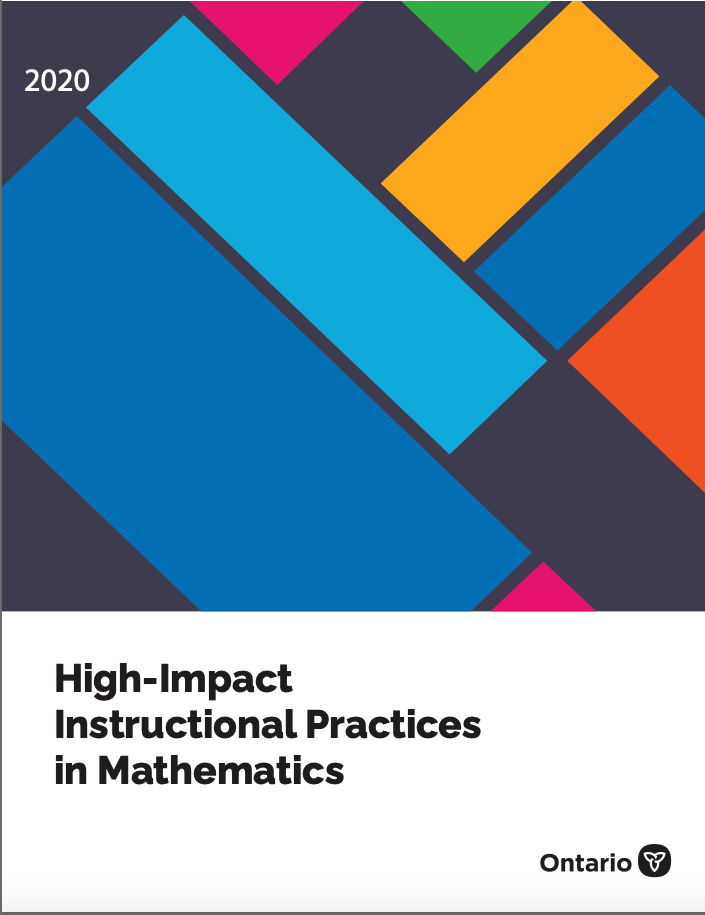 High-Impact Instructional Practices in Mathematics
[PDF]
High-Impact Instructional Practices in Mathematics
[PDF]
The thoughtful use of high-impact instructional practices – including knowing when to use them and how they might be combined to best support the achievement of specific math goals – is an essential component of effective math instruction.
 Long Range Plans
[URL]
Long Range Plans
[URL]
A long-range plan outlines a year-long plan for learning mathematics.
These sample long-range plans outline possible sequences of instruction for the school year. There are many ways to structure an effective plan for learning.
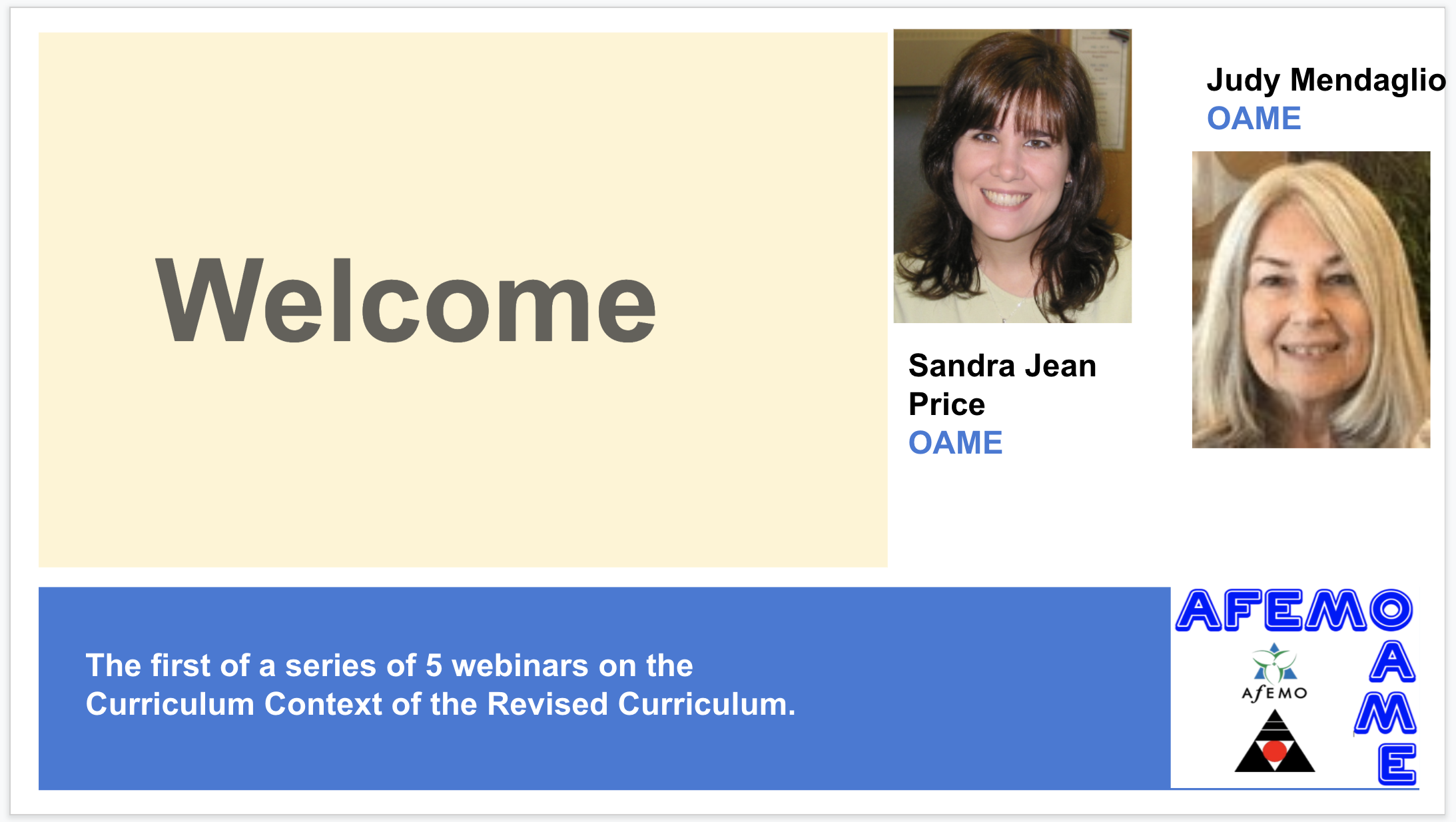 Webinar 1 - Vision, Goals, and Strands
[MP4]
Webinar 1 - Vision, Goals, and Strands
[MP4]
This hour-long webinar will outline the vision, goals and strands of the revised Ontario Elementary Mathematics Curriculum. In this webinar, we will unpack these very important sections of the Curriculum Context of the revised curriculum, providing educators with an introduction as to how this "front matter" has expanded and what these changes mean to educators as they plan their math programs. We will also give an overview of the changes in the curriculum, particularly as they relate to the strands.
Also available:
* the slides for this presentation, in Google Slides format.
* links and resources document, "Resources for Curriculum Context Webinar 1" , comprising links to research, videos, audio, and websites which may be of use to you as you continue to explore the Vision, Goals, and Strands in the Revised Elementary Math Curriculum (2020). [Google Doc]
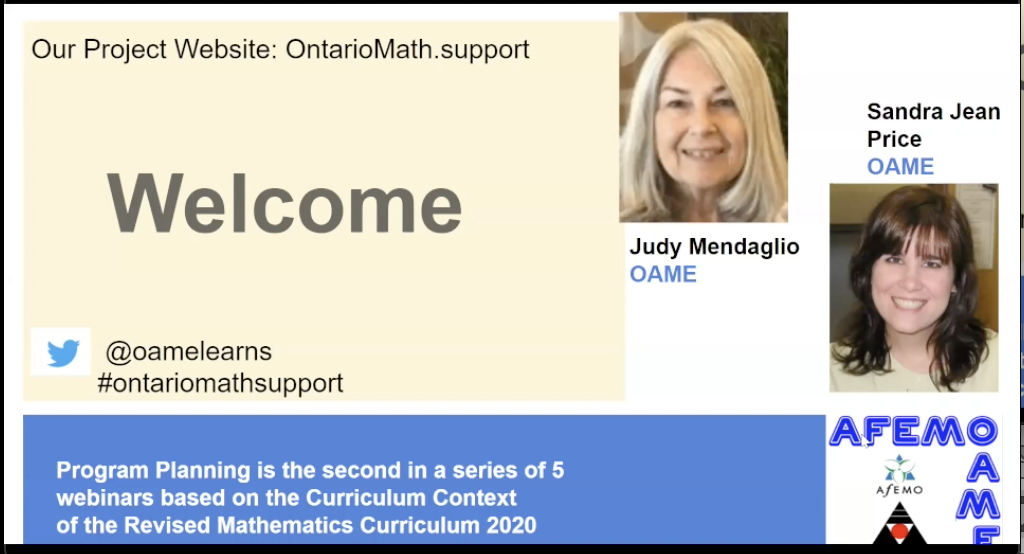 Webinar 2 - Program Planning
[MP4]
Webinar 2 - Program Planning
[MP4]
This hour-long webinar will focus on program planning for the revised Elementary Mathematics Curriculum. In this webinar, we will explore the contents of the Program Planning section of the “Curriculum Context”, and provide educators with an introduction to what these changes mean to educators as they plan their math programs.
Also available:
* the slides for this presentation, in Google Slides format.
* links and resources document, "Resources for Curriculum Context Webinar 2" , comprising links to research, videos, audio, and websites which may be of use to you as you continue to learn more about the considerations for program planning found in the Revised Elementary Math Curriculum (2020). [Google Doc]
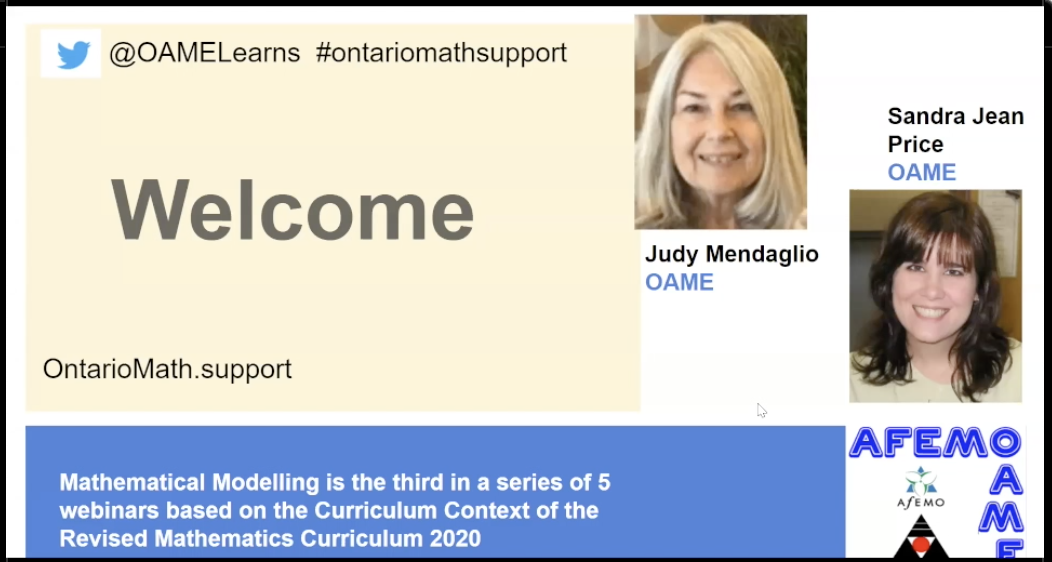 Webinar 3 - Mathematical Modelling
[MP4]
Webinar 3 - Mathematical Modelling
[MP4]
This hour-long webinar will focus on Mathematical Modelling. In this webinar, we will explore in detail what the mathematical modelling process looks like and how it is truly new to the curriculum. We hope to deepen educators’ understanding of what Mathematical Modelling is and how it can be woven into a math program. Sample tasks will be discussed.
Also available:
* the slides for this presentation, in Google Slides format.
* links and resources document, "Resources for Curriculum Context Webinar 3", comprising links to research, videos, audio, and websites which may be of use to you as you continue to learn more about the Mathematical Modelling process.
 Webinar 4 - Social-Emotional Learning (SEL) Skills in Mathematics and the Mathematical Processes
[MP4]
Webinar 4 - Social-Emotional Learning (SEL) Skills in Mathematics and the Mathematical Processes
[MP4]
This hour-long webinar focuses on Social-Emotional Learning Skills in Mathematics & the Mathematical Processes. Examine this strand in more detail, and look at connecting SEL Skills, Mathematical Processes, and assessment and instruction of the remaining five strands.
Also available:
* link and resources document, "Resources for Curriculum Context Webinar 4: Strand A - Social-Emotional Learning Skills in Mathematics and the Mathematical Processes", you will find links to research, videos, audio, and websites which may be of use to you as you continue to learn more about SES and the Mathematical Processes.
 Webinar 5 - Assessment and Evaluation
[MP4]
Webinar 5 - Assessment and Evaluation
[MP4]
This hour-long webinar focuses on Assessment and Evaluation. Revisit assessment and evaluation of student learning in light of the revised elementary math curriculum and its expanded Curriculum Context.
Also available:
* link and resources document, "Resources for Curriculum Context Webinar 5: Assessment and Evaluation", you will find links to research, videos, audio, and websites which may be of use to you as you continue to learn more about this topic.
Welcome to this webinar about teaching the new Mathematical Modelling expectations for the intermediate grades of the revised mathematics curriculum. In this webinar, we take you through the lessons that have been created by Ontario educators to support Ontario educators. These Mathematical Modelling lessons have a focus on developing students’ appreciation for the role mathematics plays in real “real life” while providing students with opportunities to experience mathematics in a more personal and relevant way.
Welcome to this webinar about teaching the new Mathematical Modelling expectations for the junior grades of the revised mathematics curriculum. In this webinar, we take you through the lessons that have been created by Ontario educators to support Ontario educators. These Mathematical Modelling lessons have a focus on developing students’ appreciation for the role mathematics plays in real “real life” while providing students with opportunities to experience mathematics in a more personal and relevant way.
Welcome to this webinar about teaching the new Mathematical Modelling expectations for the primary grades of the revised mathematics curriculum. In this webinar, we take you through the lessons that have been created by Ontario educators to support Ontario educators. These Mathematical Modelling lessons have a focus on developing students’ appreciation for the role mathematics plays in real “real life” while providing students with opportunities to experience mathematics in a more personal and relevant way.
A bilingual compilation of pertinent vocabulary directly related to computational thinking and computer programming/coding.
A continuum from Grades 1-8 outlining the key coding concepts per grade coupled with a Scratch project with teacher notes.
A summary of Virtual Manipulatives for Fractions that are available, including links, and considerations for their usage.
This Google Slides presentation was used for Webinar E1: Vision, Goals, and Strands.
This presentation is in Google Slides format, in View Only mode. If desired, you can use File -> Download, or File -> Make a copy, to save a version for yourself.
In this document, "Resources for Curriculum Context Webinar 2: Program Planning", you will find links to research, videos, audio, and websites which may be of use to you as you continue to learn more about the considerations for program planning found in the Revised Elementary Math Curriculum (2020).
This document is a Google Doc, in View Only mode. If desired, you can use File -> Download, or File -> Make a copy, to save a version for yourself.
In this document, "Resources for Curriculum Context Webinar 3: Mathematical Modelling", you will find links to research, videos, audio, and websites which may be of use to you as you continue to learn more about the Mathematical Modelling process.
This document is a Google Doc, in View Only mode. If desired, you can use File -> Download, or File -> Make a copy, to save a version for yourself.
In this document, "Resources for Curriculum Context Webinar 4: Strand A - Social-Emotional Learning Skills in Mathematics and the Mathematical Processes", you will find links to research, videos, audio, and websites which may be of use to you as you continue to learn more about SES and the Mathematical Processes.
This document is a Google Doc, in View Only mode. If desired, you can use File -> Download, or File -> Make a copy, to save a version for yourself.
In this document, "Resources for Curriculum Context Webinar 5: Assessment and Evaluation", you will find links to research, videos, audio, and websites which may be of use to you as you continue to learn more about this topic.
This document is a Google Doc, in View Only mode. If desired, you can use File -> Download, or File -> Make a copy, to save a version for yourself.
 Webinar 1 - Vision, Goals, and Strands
[MP4]
Webinar 1 - Vision, Goals, and Strands
[MP4]
This hour-long webinar will outline the vision, goals and strands of the revised Ontario Elementary Mathematics Curriculum. In this webinar, we will unpack these very important sections of the Curriculum Context of the revised curriculum, providing educators with an introduction as to how this "front matter" has expanded and what these changes mean to educators as they plan their math programs. We will also give an overview of the changes in the curriculum, particularly as they relate to the strands.
Also available:
* the slides for this presentation, in Google Slides format.
* links and resources document, "Resources for Curriculum Context Webinar 1" , comprising links to research, videos, audio, and websites which may be of use to you as you continue to explore the Vision, Goals, and Strands in the Revised Elementary Math Curriculum (2020). [Google Doc]
 Webinar 2 - Program Planning
[MP4]
Webinar 2 - Program Planning
[MP4]
This hour-long webinar will focus on program planning for the revised Elementary Mathematics Curriculum. In this webinar, we will explore the contents of the Program Planning section of the “Curriculum Context”, and provide educators with an introduction to what these changes mean to educators as they plan their math programs.
Also available:
* the slides for this presentation, in Google Slides format.
* links and resources document, "Resources for Curriculum Context Webinar 2" , comprising links to research, videos, audio, and websites which may be of use to you as you continue to learn more about the considerations for program planning found in the Revised Elementary Math Curriculum (2020). [Google Doc]
 Webinar 3 - Mathematical Modelling
[MP4]
Webinar 3 - Mathematical Modelling
[MP4]
This hour-long webinar will focus on Mathematical Modelling. In this webinar, we will explore in detail what the mathematical modelling process looks like and how it is truly new to the curriculum. We hope to deepen educators’ understanding of what Mathematical Modelling is and how it can be woven into a math program. Sample tasks will be discussed.
Also available:
* the slides for this presentation, in Google Slides format.
* links and resources document, "Resources for Curriculum Context Webinar 3", comprising links to research, videos, audio, and websites which may be of use to you as you continue to learn more about the Mathematical Modelling process.
 Webinar 4 - Social-Emotional Learning (SEL) Skills in Mathematics and the Mathematical Processes
[MP4]
Webinar 4 - Social-Emotional Learning (SEL) Skills in Mathematics and the Mathematical Processes
[MP4]
This hour-long webinar focuses on Social-Emotional Learning Skills in Mathematics & the Mathematical Processes. Examine this strand in more detail, and look at connecting SEL Skills, Mathematical Processes, and assessment and instruction of the remaining five strands.
Also available:
* link and resources document, "Resources for Curriculum Context Webinar 4: Strand A - Social-Emotional Learning Skills in Mathematics and the Mathematical Processes", you will find links to research, videos, audio, and websites which may be of use to you as you continue to learn more about SES and the Mathematical Processes.
 Webinar 5 - Assessment and Evaluation
[MP4]
Webinar 5 - Assessment and Evaluation
[MP4]
This hour-long webinar focuses on Assessment and Evaluation. Revisit assessment and evaluation of student learning in light of the revised elementary math curriculum and its expanded Curriculum Context.
Also available:
* link and resources document, "Resources for Curriculum Context Webinar 5: Assessment and Evaluation", you will find links to research, videos, audio, and websites which may be of use to you as you continue to learn more about this topic.
Welcome to this webinar about coding in the mathematics curriculum. We will be taking you through the pedagogy and social emotional learning skills that coding brings to your classroom as well as the lessons that have been created as supports for Ontario teachers in the Junior grades.
NOTE: This recording does not yet contain the Q&A section - those will be added soon from all the recordings with captioning.
Welcome to this webinar about teaching the new coding expectations for the intermediate grades of the revised mathematics curriculum. We will be taking you through the lessons that have been created as supports for Ontario educators as well as the pedagogy and social emotional learning skills that coding brings to your classroom.
NOTE: This recording does not yet contain the Q&A section - those will be added soon from all the recordings with captioning.
Welcome to this webinar about coding in the mathematics curriculum. We will be taking you through the pedagogy and social emotional learning skills that coding brings to your classroom as well as the lessons that have been created as supports for Ontario teachers in the primary grades.
NOTE: This recording does not yet contain the Q&A section - those will be added soon from all the recordings with captioning.
Welcome to this webinar about teaching the new Financial Literacy expectations for the primary grades of the revised mathematics curriculum. In this webinar, we take you through the lessons that have been created by Ontario educators to support Ontario educators. In developing the Financial Literacy lessons for this project, the intentional decision to use scenarios-based tasks was made. The goal of the lessons were to provide real-life contexts for students to develop their understanding of money concepts, as an individual and a community.
Welcome to this webinar about teaching the Number expectations for the primary grades of the revised mathematics curriculum. In this webinar, we take you through the lessons that have been created by Ontario educators to support Ontario educators. These Number lessons have a focus on developing fraction concepts and skills. These lessons benefit from the latest research about learning fractions, including an emphasis on high-yield visual representations.
Welcome to this webinar about teaching the new Mathematical Modelling expectations for the primary grades of the revised mathematics curriculum. In this webinar, we take you through the lessons that have been created by Ontario educators to support Ontario educators. These Mathematical Modelling lessons have a focus on developing students’ appreciation for the role mathematics plays in real “real life” while providing students with opportunities to experience mathematics in a more personal and relevant way.
Welcome to this webinar about teaching the new Financial Literacy expectations for the junior grades of the revised mathematics curriculum. In this webinar, we take you through the lessons that have been created by Ontario educators to support Ontario educators. In developing the Financial Literacy lessons for this project, the intentional decision to use scenarios was made. Scenarios give the opportunity to have a discussion about financial choices and the inequities of access to those choices. The goal was to provide students with a chance to learn and understand the individual skills needed that impact personal financial choices and also the economic literacy needed to understand the impact of financial systems as a whole.
Welcome to this webinar about teaching the Number expectations for the junior grades of the revised mathematics curriculum. In this webinar, we take you through the lessons that have been created by Ontario educators to support Ontario educators. These Number lessons have a focus on developing fraction concepts and skills. These lessons benefit from the latest research about learning fractions, including an emphasis on high-yield visual representations.
Welcome to this webinar about teaching the new Mathematical Modelling expectations for the junior grades of the revised mathematics curriculum. In this webinar, we take you through the lessons that have been created by Ontario educators to support Ontario educators. These Mathematical Modelling lessons have a focus on developing students’ appreciation for the role mathematics plays in real “real life” while providing students with opportunities to experience mathematics in a more personal and relevant way.
Welcome to this webinar about teaching the new Financial Literacy expectations for the intermediate grades of the revised mathematics curriculum. In this webinar, we take you through the lessons that have been created by Ontario educators to support Ontario educators. In developing the Financial Literacy lessons for this project, the intentional decision to use scenarios was made. Scenarios give the opportunity to have a discussion about financial choices and the inequities of access to those choices. The goal was to provide students with a chance to learn and understand the individual skills needed that impact personal financial choices and also the economic literacy needed to understand the impact of financial systems as a whole.
Welcome to this webinar about teaching the Number expectations for the intermediate grades of the revised mathematics curriculum. In this webinar, we take you through the lessons that have been created by Ontario educators to support Ontario educators. These Number lessons have a focus on developing fraction concepts and skills. These lessons benefit from the latest research about learning fractions, including an emphasis on high-yield visual representations.
Welcome to this webinar about teaching the new Mathematical Modelling expectations for the intermediate grades of the revised mathematics curriculum. In this webinar, we take you through the lessons that have been created by Ontario educators to support Ontario educators. These Mathematical Modelling lessons have a focus on developing students’ appreciation for the role mathematics plays in real “real life” while providing students with opportunities to experience mathematics in a more personal and relevant way.
This webinar will introduce Ontario educators to three (3) course plans, each of which outlines a different way a teacher could structure the 2021 Grade 9 math course. These course plans have been shared on our OntarioMath.support website. Each course plan includes all of the curriculum expectations, providing suggestions as to how to group expectations to present mathematics in Grade 9 as a connected whole. In addition to providing ways to structure the course, each plan offers ideas for questions and tasks that will engage students with the mathematics they are learning. In this webinar, we will also outline the underlying principles upon which all three course plans have been designed to provide support for teachers as they implement a de-streamed grade 9 curriculum.
Also available: In "Resources related to Course Planning Webinar", you will find links to research, videos, audio, and websites which may be of use to you as you continue to learn more about Course Planning and the Revised Math Curriculum (2021).
This document is a Google Doc, in View Only mode. If desired, you can use File -> Download, or File -> Make a copy, to save a version for yourself.
August 2021
In this webinar about the transition from the revised elementary mathematics curriculum (2020) to the newly revised Grade 9 mathematics curriculum (2021), participants will receive specific information about the alignment of expectations for grades 7, 8, and 9. They will also receive guidance on approaches to course planning as well as lesson and assessment planning. References and resources available to support teachers will be shared. A Question and Answer period will be included in this webinar.
Also available: In "Resources for Secondary Transitions Webinar", you will find links to research, videos, audio, and websites which may be of use to you as you continue to learn more about the Revised Math Curriculum (2021).
This document is a Google Doc, in View Only mode. If desired, you can use File -> Download, or File -> Make a copy, to save a version for yourself.
How are de-streamed classrooms different? How must instruction and assessment be shifted to accommodate these differences? In this webinar, we will talk about the goal of ensuring success for ALL our students, as well as considerations and ideas that will support teachers as they plan their math programs.
Also available: In "Resources related to De-Streaming for Success Webinar", you will find links to research, videos, audio, and websites which may be of use to you as you continue to learn more about De-streaming and the Revised Math Curriculum (2021).
This document is a Google Doc, in View Only mode. If desired, you can use File -> Download, or File -> Make a copy, to save a version for yourself.
Creating a safe and inclusive learning environment, one that encourages student collaboration and student choice, is critical to successfully implementing the 2021 de-streamed mathematics program. In this webinar, we will share practical strategies for meeting the challenges of teaching this new curriculum while ensuring equity and inclusivity, bringing student voice and student lived experiences into the mathematics learning.
Also available: In "Resources related to Shaping the Learning Environment Webinar", you will find links to research, videos, audio, and websites which may be of use to you as you continue to learn more about the Revised Math Curriculum (2021).
This document is a Google Doc, in View Only mode. If desired, you can use File -> Download, or File -> Make a copy, to save a version for yourself.
“In Grade 9, students transition to using coding as a tool to interact with the mathematics they are learning. They use the skills developed in elementary to create and alter code in a multitude of coding environments including text-based programming languages, spreadsheets, computer algebra systems (CAS), and virtual graphing and geometry tools.” (2021 MTH1W)
What do students know about coding coming into Grade 9? How am I supposed to teach coding as well as all the other math expectations? How can I support students when I don’t know how to code? If you’ve asked yourself some of these questions, come to this webinar to explore some answers.
Also available: In "Resources: Strand A - Mathematical Thinking and Making Connections through Coding", you will find links to research, videos, audio, and websites which may be of use to you as you continue to learn more about the Revised Math Curriculum (2021).
This document is a Google Doc, in View Only mode. If desired, you can use File -> Download, or File -> Make a copy, to save a version for yourself.
This hour-long webinar will focus on how the process of Mathematical Modelling, integrated with Grade 9 math concepts, can effectively support student development of strong mathematical thinking skills. In this webinar, we will explore in detail what the mathematical modelling process looks like and how it naturally builds connections between math and other disciplines, as well as between math and students' own cultures and communities. We hope to deepen educators’ understanding of what Mathematical Modelling is and how it can be woven into a math program. Sample tasks will be discussed.
Also available: In "Resources: Strand A - Mathematical Thinking and Making Connections through Mathematical Modelling", you will find links to research, videos, audio, and websites which may be of use to you as you continue to learn more about the Revised Math Curriculum (2021).
This document is a Google Doc, in View Only mode. If desired, you can use File -> Download, or File -> Make a copy, to save a version for yourself.
Students in Ontario are navigating a complex world driven by data. Our world is evolving and new fields and careers are emerging that require individuals with high levels of data literacy. Supporting students as they develop critical data literacy skills is an essential component of the new de-streamed Grade 9 curriculum. Data literacy is different from data management. Certainly, data management skills are important to analyse data. As part of the revised elementary mathematics curriculum in 2020, students have been building their data management skills. How do we connect these with the larger goal of achieving data literacy? What are the competencies necessary for data literacy, and how will we continue to build these competencies to ensure that all students leave our schools as data literate young adults? In this webinar, we will talk more about these competencies, and we will share strategies for integrating data literacy into the teaching of each of the math strands.
Also available: In "Resources: Data Literacy Across the Strands", you will find links to research, videos, audio, and websites which may be of use to you as you continue to learn more about the Revised Math Curriculum (2021).
This document is a Google Doc, in View Only mode. If desired, you can use File -> Download, or File -> Make a copy, to save a version for yourself.


